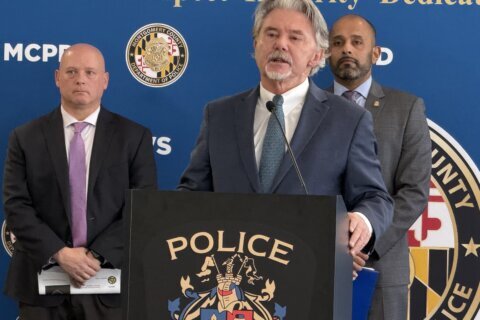Montgomery County Executive Marc Elrich is expressing some hesitancy about meeting a goal set by Maryland Gov. Larry Hogan of having enough people in the state vaccinated to “get things back to normal by Memorial Day.”
Speaking to reporters during a weekly media briefing Wednesday, Elrich said, “This is all numbers driven, so we’ll see where we are on Memorial Day.”
The county, which has been a leader in the state in terms of vaccinating its population, has recently seen a 25% average slowdown in the pace of administering shots in part because of lower uptake in the population of young “invincibles” in the 20-30 age range, officials said.
“If the rest of the state is having the same difficulty getting people vaccinated — and I believe everybody’s seeing the same fall-off — it’s a little bit difficult to see,” Elrich added.
Overall, more than 54% of the county’s residents have received at least one vaccine dose, and 39% are fully vaccinated.
The county has tied further reopening to the vaccination rate. Once 60% of the entire population has received at least one shot, the county will relax restrictions on businesses and gatherings even further. Once 50% of the population is fully vaccinated, the county would start following state guidelines, which are generally looser.
“I wish I could say I was sure we would achieve all those things in that time frame, but it’s not certain we will,” Elrich said of the governor’s Memorial Day goal. “Just fundamentally, it bothers me when people set dates that you cannot relate to the science of the thing you’re trying to deal with … The governor doesn’t know how many people are ready and willing to take the vaccines.”
Elrich added, “I wish people would just be patient.”
Elrich has frequently clashed with the governor over the pace of reopening and the lifting of restrictions, and the county has adopted a generally slower approach, which he credits for its performance in controlling the spread of the coronavirus.
Of a goal set by President Joe Biden to have 70% of adult Americans vaccinated by July Fourth, Elrich said: “I think we will get a very high percentage of the population vaccinated by July.” But he added that’s dependent on continuing to keep the pace of vaccinations steady.
County data show a lagging pace of vaccinations for those under 40.
“Even though we have seen more severe cases of COVID pop up in the younger group, I still think part of it is this sense of, ‘Well if I get it, it won’t be that bad,” said the county’s health officer, Dr. Travis Gayles said.
He added, “So I think it’s a sense of, ‘I’m young, I’m healthy, I’m invincible’ … I think that plays a factor into the willingness and readiness to get the vaccine compared to the sense of urgency that we saw a little bit more in our older populations early on in the vaccine distribution process.”
Earl Stoddard, the director of the county’s office of homeland security and emergency management, said the county is working to make getting a vaccine more convenient by expanding hours and locations at vaccine clinics.
The county’s mass vaccine clinic at the Germantown campus of Montgomery College is taking walk-ups every day from 10 a.m. to 2:30 p.m. All 12 other mass vaccination clinics in the county are also now taking walk-ups, the governor’s office announced Wednesday.
Stoddard said what the county is seeing now with the declining pace of vaccinations is not necessarily vaccine hesitancy. “This is … a loss of the sense of urgency among this population,” because they feel they aren’t as likely to get seriously sick, he said.
The key is to convince younger people that getting vaccinated themselves helps protect other members of their community, such as children, who aren’t yet eligible to be vaccinated.
Older county residents, who were eligible for the shots starting in the winter, are the most vaccinated group in the county. About 85% of residents 65 and older have received at least one vaccine dose, according to county data.
But county leaders said they aren’t ready to reopen senior centers, libraries and recreation centers just yet.
“The senior population has been the most vulnerable population to COVID … so we’ve tried to maintain an abundance of caution,” Elrich said.
In part, the reopening of senior centers presents a logistical challenge, Stoddard said. Staff at those centers have been working on the county’s testing and vaccination efforts.
Some recreation centers have also been repurposed as vaccine sites themselves.
“It’s going to take some (time) to relieve staff and facilities … We don’t want to have our pandemic response lessened while simultaneously opening our senior centers.”
- Sign up for WTOP alerts
- Latest coronavirus test results in DC, Maryland and Virginia
- Coronavirus vaccine FAQ: What you need to know
- Latest vaccination numbers in DC, Maryland and Virginia
Looking for more information? D.C., Maryland and Virginia are each releasing more data every day. Visit their official sites here: Virginia | Maryland | D.C.
Pandemic prevention center: Aims to stop future pandemics
Officials also provided more details about an ambitious plan to launch a global pandemic prevention center in the county.
The Montgomery County Council on Tuesday approved $500,000 in funding for the center, billed as a first-of-its-kind effort to bring together government, private-sector and academic researchers and stockpile monoclonal antibodies for the 100 top pathogens in the world.
Backers call that move the “moonshot” of pandemic prevention.
Stu Solomon, president and CEO of the nonprofit Connected DMV group that is planning the center, said the group is now scouting locations for the center in Montgomery County and hopes to complete the site selection by late August and to formally launch the new pandemic prevention and biodefense center around the same time frame.
“Greater Washington is obviously the right place to lead and Montgomery County sits at the heart of that,” he said. The county is home to the National Institutes of Health, the Centers for Disease Control and Prevention and a thriving biotech sector.
A key part of the plan is the $2.5 billion “Ahead 100” project, which was pioneered by Vanderbilt University’s Dr. James Crowe and calls for stockpiling antibodies to help respond to future pandemics.
“We’re working to develop a stockpile of those antibodies so that when an outbreak occurs, we can immediately protect health care workers, we can immediately protect the surrounding community from the outbreak,” Solomon said. The effort aims to “fill that gap in the chain, so that a solution can be available on day one, when an outbreak occurs. When we do that, that will stop the outbreak cold in its tracks.”







